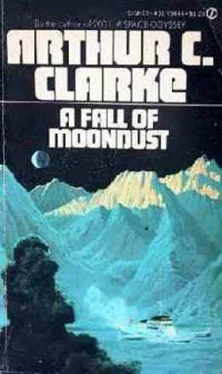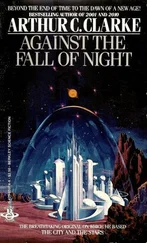Arthur Clarke - A Fall of Moondust
Здесь есть возможность читать онлайн «Arthur Clarke - A Fall of Moondust» весь текст электронной книги совершенно бесплатно (целиком полную версию без сокращений). В некоторых случаях можно слушать аудио, скачать через торрент в формате fb2 и присутствует краткое содержание. Жанр: Фантастика и фэнтези, на английском языке. Описание произведения, (предисловие) а так же отзывы посетителей доступны на портале библиотеки ЛибКат.
- Название:A Fall of Moondust
- Автор:
- Жанр:
- Год:неизвестен
- ISBN:нет данных
- Рейтинг книги:5 / 5. Голосов: 1
-
Избранное:Добавить в избранное
- Отзывы:
-
Ваша оценка:
- 100
- 1
- 2
- 3
- 4
- 5
A Fall of Moondust: краткое содержание, описание и аннотация
Предлагаем к чтению аннотацию, описание, краткое содержание или предисловие (зависит от того, что написал сам автор книги «A Fall of Moondust»). Если вы не нашли необходимую информацию о книге — напишите в комментариях, мы постараемся отыскать её.
A Fall of Moondust — читать онлайн бесплатно полную книгу (весь текст) целиком
Ниже представлен текст книги, разбитый по страницам. Система сохранения места последней прочитанной страницы, позволяет с удобством читать онлайн бесплатно книгу «A Fall of Moondust», без необходимости каждый раз заново искать на чём Вы остановились. Поставьте закладку, и сможете в любой момент перейти на страницу, на которой закончили чтение.
Интервал:
Закладка:
“Perhaps the poor fellow has no one on Earth he wants to speak to.”
“A man with enough money to go to the Moon must have some friends”, replied Hansteen. Then he grinned; it was almost a boyish grin, which flickered swiftly across his face, softening its wrinkles and crow's feet. “That sounds very cynical — I didn't mean it that way. But I suggest we keep an eye on Mr. Radley.”
“Have you mentioned him to Sue — er, Miss Wilkins?”
“She pointed him out to me.”
I should have guessed that, thought Pat admiringly; not much gets past her. Now that it seemed he might have a future, after all, he had begun to think very seriously about Sue, and about what she had said to him. In his life he had been in love with five or six girls — or so he could have sworn at the time — but this was something different. He had known Sue for over a year, and from the start had felt attracted to her, but until now it had never come to anything. What were her real feelings? he wondered. Did she regret that moment of shared passion, or did it mean nothing to her? She might argue — and so might he, for that matter — that what had happened in the air lock was no longer relevant; it was merely the action of a man and a woman who thought that only a few hours of life remained to them. They had not been themselves.
But perhaps they had been; perhaps it was the real Pat Harris, the real Sue Wilkins, that had finally emerged from disguise, revealed by the strain and anxiety of the past few days. He wondered how he could be sure of this, but even as he did so, he knew that only time could give the answer. If there was a clear-cut, scientific test that could tell you when you were in love, Pat had not yet come across it.
The dust that lapped — if that was the word — against the quay from which Selene had departed four days ago was only a couple of meters deep, but for this test no greater depth was needed. If the hastily built equipment worked here, it would work out in the open Sea.
Lawrence watched from the Embarkation Building as his space-suited assistants bolted the framework together. It was made, like ninety per cent of the structures on the Moon, from slotted aluminum strips and bars. In some ways, thought Lawrence, the Moon was an engineer's paradise. The low gravity, the total absence of rust or corrosion — indeed, of weather itself, with its unpredictable winds and rains and frosts-removed at once a whole range of problems that plagued all terrestrial enterprises. But to make up for that, of course, the Moon had a few specialities of its own — like the two-hundred-below-zero nights, and the dust that they were fighting now.
The light framework of the raft rested upon a dozen large metal drums, which carried the prominently stenciled words: “Contents Ethyl Alcohol. Please return when empty to No. 3 Dispatching Center, Copernicus.” Their contents now were a very high grade of vacuum; each drum could support a weight of two lunar tons before sinking.
Now the raft was rapidly taking shape. Be sure to have plenty of spare nuts and bolts, Lawrence told himself. He had seen at least six dropped in the dust, which had instantly swallowed them. And there went a wrench. Make an order that all tools must be tied to the raft even when in use, however inconvenient that might be.
Fifteen minutes — not bad, considering that the men were working in vacuum and therefore were hampered by their suits. The raft could be extended in any direction as required, but this would be enough to start with. This first section alone could carry over twenty tons, and it would be some time before they unloaded that weight of equipment on the site.
Satisfied with this stage of the project, Lawrence left the Embarkation Building while his assistants were still dismantling the raft. Five minutes later (that was one advantage of Port Roris — you could get anywhere in five minutes), he was in the local engineering depot. What he found there was not quite so satisfactory.
Supported on a couple of trestles was a two-meter-square mock-up of Selene's roof — an exact copy of the real thing, made from the same materials. Only the outer sheet of aluminized fabric that served as a sun shield was missing; it was so thin and flimsy that it would not affect the test.
The experiment was an absurdly simple one, involving only three ingredients: a pointed crowbar, a sledge hammer, and a frustrated engineer, who, despite strenuous efforts, had not yet succeeded in hammering the bar through the roof.
Anyone with a little knowledge of lunar conditions would have guessed at once why he had failed. The hammer, obviously, had only a sixth of its terrestrial weight; therefore — equally obviously — it was that much less effective.
The reasoning would have been completely false. One of the hardest things for the layman to understand was the difference between weight and mass, and the inability to do so had led to countless accidents. For weight was an arbitrary characteristic; you could change it by moving from one world to another. On Earth, that hammer would weigh six times as much as it did here; on the sun, it would be almost two hundred times heavier; and in space it would weigh nothing at all.
But in all three places, and indeed throughout the Universe, its mass or inertia would be exactly the same. The effort needed to set it moving at a certain speed, and the impact it would produce when stopped, would be constant through all space and time. On a nearly gravityless asteroid, where it weighed less than a feather, that hammer would pulverize a rock just as effectively as on Earth.
“What's the trouble?” said Lawrence.
“The roof's too springy”, explained the engineer, rubbing the sweat from his brow. “The crowbar just bounces back every time it's hit.”
“I see. But will that happen when we're using a fifteen-meter pipe, with dust packed all around it? That may absorb the recoil.”
“Perhaps — but look at this.”
They kneeled beneath the mock-up and inspected the underside of the roof. Chalk lines had been drawn upon it to indicate the position of the electric wiring, which had to be avoided at all costs.
“This Fiberglas is so tough, you can't make a clean hole through it. When it does yield, it splinters and tears. See — it's already begun to star. I'm afraid that if we try this bruteforce approach, we'll crack the roof.”
“And we can't risk that”, Lawrence agreed. “Well, drop the idea. If we can't pile drive, we'll have to bore. Use a drill, screwed on the end of the pipe so it can be detached easily. How are you getting on with the rest of the plumbing?”
“Almost ready — it's all standard equipment. We should be finished in two or three hours.”
“I'll be back in two”, said Lawrence. He did not add, as some men would have done, “I want it finished by then.” His staff was doing its utmost, and one could neither bully nor cajole trained and devoted men into working faster than their maximum. Jobs like this could not be rushed, and the deadline for Selene's oxygen supply was still three days away. In a few hours, if all went well, it would have been pushed into the indefinite future.
Unfortunately, all was going very far from well.
Commodore Hansteen was the first to recognize the slow, insidious danger that was creeping up upon them. He had met it once before, when he had been wearing a faulty space suit on Ganymede — an incident he had no wish to recall, but had never really forgotten.
“Pat”, he said quietly, making sure that no one could overhear. “Have you noticed any difficulty in breathing?”
Pat looked startled, then answered, “Yes, now that you mention it. I'd put it down to the heat.”
“So did I at first. But I know these symptoms — especially the quick breathing. We're running into carbon-dioxide poisoning.”
Читать дальшеИнтервал:
Закладка:
Похожие книги на «A Fall of Moondust»
Представляем Вашему вниманию похожие книги на «A Fall of Moondust» списком для выбора. Мы отобрали схожую по названию и смыслу литературу в надежде предоставить читателям больше вариантов отыскать новые, интересные, ещё непрочитанные произведения.
Обсуждение, отзывы о книге «A Fall of Moondust» и просто собственные мнения читателей. Оставьте ваши комментарии, напишите, что Вы думаете о произведении, его смысле или главных героях. Укажите что конкретно понравилось, а что нет, и почему Вы так считаете.












